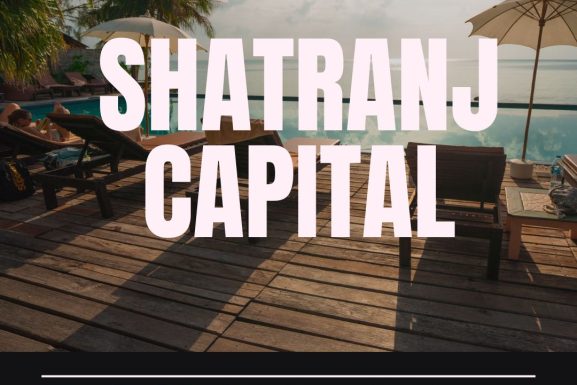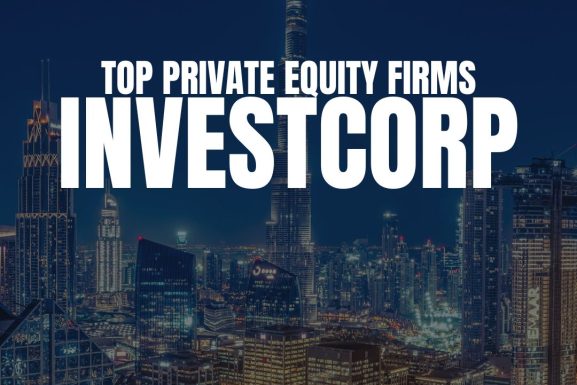
- Private Equity News Middle East -
Latest Equity News Middle East
The Middle East private equity industry is bucking the global trend of slowing dealmaking, with investors pouring over $14 billion into a record 64 buyouts in the region so far this year so let's take a look at the latest Private Equity News Middle East Deals & Raises below


Private Equity News Middle East Overview - The State of Market
The Middle East private equity industry is bucking the global trend of slowing dealmaking, with investors pouring over $14 billion into a record 64 buyouts in the region so far this year.
The surge in activity is being driven by a number of factors, including strong economic growth, rising disposable incomes, and a growing number of attractive investment targets.
The region's sovereign wealth funds (SWFs) are playing a major role in driving the private equity boom. In 2022, SWFs from the Gulf accounted for 57% of all private equity deals in the Middle East, according to data from Preqin.
Mubadala Investment Company, the Abu Dhabi SWF, has been particularly active in the region, with investments in companies such as Abu Dhabi National Energy Company (TAQA), Aldar Properties, and Etihad Rail.
Other active SWFs in the Middle East include the Saudi Arabian Public Investment Fund (PIF), the Qatar Investment Authority (QIA), and the Kuwait Investment Authority (KIA).
Private Equity News Middle East
In addition to SWFs, other major players in the Middle East private equity industry include international private equity firms, family offices, and pension funds.
The region's private equity market is still relatively small compared to other parts of the world, but it is growing rapidly.
In 2022, the Middle East private equity market was valued at $100 billion, and it is expected to reach $200 billion by 2025.
Private equity News Middle East
The strong growth of the Middle East private equity industry is being driven by a number of factors, including:
Strong economic growth: The Middle East is one of the fastest-growing regions in the world, with GDP growth averaging 4% in recent years. This economic growth is creating a large pool of potential investment opportunities.
Rising disposable incomes: Middle Eastern consumers are enjoying rising disposable incomes, which is leading to increased demand for goods and services. This is creating opportunities for private equity firms to invest in consumer-facing businesses.
Growing number of attractive investment targets: The Middle East is home to a number of large, well-established companies that are attractive to private equity investors. These companies are often looking for partners to help them expand their businesses or enter new markets.
Active government support: Governments in the Middle East are actively supporting the development of the private equity industry. This support includes providing tax breaks, regulatory reforms, and other incentives to attract private equity investment.
The Middle East private equity industry is poised for continued growth in the years to come. The region's strong economic growth, rising disposable incomes, and growing number of attractive investment targets will continue to attract private equity investment.
In addition, the active support of governments in the region will help to further develop the industry.

Private Equity News Middle East Key trends
The growth of the healthcare sector: The healthcare sector is another fast-growing sector in the Middle East. This is creating opportunities for private equity firms to invest in healthcare companies, such as hospitals, clinics, and pharmaceutical companies.
The growth of the infrastructure sector: The infrastructure sector is also growing in the Middle East. This is creating opportunities for private equity firms to invest in infrastructure projects, such as roads, bridges, and power plants.
The political and economic stability of the region: The political and economic stability of the region will have a significant impact on the future of private equity in the Middle East. If the region becomes more stable, it will attract more investment from private equity firms.
The regulatory environment in the region: The regulatory environment in the region will also have an impact on the future of private equity in the Middle East. If the regulatory environment becomes more favorable, it will attract more investment from private equity firms.
The availability of capital: The availability of capital will also have an impact on the future of private equity in the Middle East. If there is more capital available, it will attract more investment from private equity firms.
Private Equity News Middle East
Growing focus on sustainable investing: Investors are increasingly looking to invest in companies that are committed to environmental, social, and governance (ESG) principles. This trend is expected to continue in the Middle East, as investors seek to make a positive impact on the region's economy and society.
Increased interest in digital businesses: The Middle East is a rapidly growing digital market, and this is leading to increased interest from private equity firms in digital businesses. These businesses are often more scalable and profitable than traditional businesses, making them attractive investment targets.
Expanding into new markets: Private equity firms in the Middle East are increasingly looking to expand into new markets, such as Africa and Southeast Asia. This is being driven by the search for new investment opportunities and the desire to diversify their portfolios.

Private Equity News Middle East
Key challenges:
Lack of deal flow: There has been a lack of attractive investment opportunities in the Middle East in recent years. This is due to a number of factors, including the economic slowdown in the region, the political instability in some countries, and the lack of transparency in the market.
Political risk: The political risk in the Middle East is another challenge facing the private equity industry. The region has been unstable in recent years, and this has made investors hesitant to invest in the region.
Regulatory uncertainty: The regulatory environment in the Middle East is also a challenge for private equity firms. The rules and regulations governing private equity activity are often unclear, and this can make it difficult for firms to operate in the region.
Lack of infrastructure: The lack of infrastructure in the Middle East is another challenge facing the private equity industry. This makes it difficult for firms to invest in businesses in the region, as they may not have access to the necessary resources.
Despite these challenges, the private equity industry in the Middle East is still growing.
There are a number of factors that are driving this growth, including the increasing wealth of the region's population, the growing demand for private equity investment, and the increasing number of private equity firms in the region.
The private equity industry in the Middle East is likely to continue to grow in the coming years. However, the industry will need to address the challenges it faces in order to sustain this growth.
Private Equity News Middle East - Possible solutions
Government support: The government can play a role in supporting the private equity industry by providing tax breaks and other incentives to attract investment.
Improved regulatory environment: The regulatory environment in the Middle East needs to be improved in order to make it easier for private equity firms to operate in the region.
Increased transparency: The lack of transparency in the Middle East market is a major challenge for private equity firms. The market needs to become more transparent in order to attract investment.
Investment in infrastructure: The lack of infrastructure in the Middle East is a major challenge for private equity firms. The government and private sector need to invest in infrastructure in order to make it easier for businesses to operate in the region.
By addressing these challenges, the private equity industry in the Middle East can continue to grow and contribute to the economic development of the region.

Private Equity News Middle East - The Future
The private equity industry in the Middle East has seen significant growth in recent years. The region's wealth has increased, and there is a growing demand for private equity investment.
As a result, there are now more private equity firms in the Middle East than ever before.
The future of private equity in the Middle East is bright.
The region has a number of factors that are driving growth in the industry, including:
The increasing wealth of the region's population: The Middle East is home to some of the wealthiest people in the world. This wealth is being used to invest in private equity, as investors seek to diversify their portfolios and achieve higher returns.
The growing demand for private equity investment: The demand for private equity investment in the Middle East is growing. This is due to the region's strong economic growth, as well as the increasing number of family offices and other institutional investors.
The increasing number of private equity firms: There are now more private equity firms in the Middle East than ever before. This is due to the growth in demand for private equity investment, as well as the increasing availability of capital.
Overall, the future of private equity in the Middle East is bright. The region has a number of factors that are driving growth in the industry, and the future of private equity in the Middle East is likely to be strong.
Like Rainmakrr?
Check out the Financial Times and The Wall St Journal for other great sources of private equity news UK and international stories
Private Equity News Middle East: Latest Developments in the Region
Private equity has been making headlines in the Middle East in recent years as investors look for alternative ways to grow their wealth.
According to a survey conducted by The National, more than 44% of the region's investors plan to commit more capital to private equity in the coming year.
This growing interest in private equity is a reflection of the region's economic optimism and abundant capital.
In 2022, private equity is well-positioned in the Middle East amid the global IPO boom. The region's private equity firms are expected to benefit from the increasing demand for alternative sources of financing as companies look to raise capital. This trend is expected to continue as investors seek to diversify their portfolios and take advantage of the region's growing economy.
Key Takeaways
The Middle East's interest in private equity is rising, with more than 44% of investors planning to commit more capital to this sector in the coming year.
Private equity is well-positioned in the Middle East amid the global IPO boom, with the region's firms expected to benefit from the increasing demand for alternative sources of financing.
This trend is expected to continue as investors seek to diversify their portfolios and take advantage of the region's growing economy.
Overview of Middle East Private Equity
Private equity has been gaining traction in the Middle East region as investors seek to diversify their portfolios. According to a recent survey, 18% of investors in the Middle East and Africa have yet to embark on a digital transformation journey, while almost one third of them do not take ESG factors into consideration.
The Middle East and North Africa (MENA) region has been a long-standing target for international private equity firms. However, private equity investment in the region has fallen sharply in recent years. In order to raise their game, private equity firms need to focus on improving their investment strategies and building relationships with local investors.
Despite the challenges, the private equity industry in the Middle East has shown resilience and continues to attract interest from investors. As per a report, around 88% of private equity deal-making activity in the Middle East and Africa decreased in the second half of 2020.
The consumer sector has overtaken information technology as the most attractive sector for private equity investors in the region. This is due to the growing consumer market in the Middle East, which is expected to continue to grow in the coming years.
Overall, the private equity industry in the Middle East is expected to continue to grow as investors seek to diversify their portfolios and tap into the region's growing consumer market.
Private Equity Trends in 2022
Private equity (PE) investments in the Middle East and Africa (MEA) region have been on an upward trajectory in recent years, with 2022 expected to be no different. The following sub-sections will explore some of the key trends that are shaping the industry in 2022.
Impact of Covid-19
The Covid-19 pandemic has had a significant impact on the global economy, and the PE industry in the MEA region has not been immune to its effects. However, the industry has shown resilience and adaptability, with many firms pivoting towards sectors that have seen increased demand as a result of the pandemic, such as healthcare, e-commerce, and logistics.
Technology Influence
Technology continues to be a major driver of growth in the PE industry, with firms increasingly looking to invest in companies that are leveraging technology to disrupt traditional industries. This trend is particularly evident in the fintech space, where digital payments and lending platforms are attracting significant investment.
Market Diversification
Another trend that is gaining momentum in the MEA region is market diversification. Historically, the majority of PE investments in the region have been concentrated in a few key sectors, such as oil and gas, real estate, and infrastructure. However, as the region continues to develop and mature, investors are increasingly looking to diversify their portfolios by investing in a wider range of sectors, such as healthcare, education, and consumer goods.
In conclusion, the PE industry in the MEA region is poised for continued growth in 2022, with firms adapting to the challenges posed by the Covid-19 pandemic and leveraging technology to drive growth. Market diversification is also emerging as a key trend, as investors seek to broaden their portfolios and tap into new opportunities across a range of sectors.
Investment Analysis
Venture Capital Insight
According to a survey conducted in 2022, 29% of firms in the Middle East invest in venture capital. The survey also found that over 44% of the region's investors plan to commit more capital to private equity in the coming year. This indicates a growing interest in venture capital and private equity in the Middle East.
The report also highlights that venture capital investments in the region are focused on sectors such as technology, healthcare, and education. The technology sector, in particular, has seen a surge in venture capital investments in recent years. This is due to the growing demand for technology solutions in the region and the increasing number of startups.
Angel Investors and IPOs
Angel investors play a crucial role in the Middle East's startup ecosystem. They provide early-stage funding to startups and are often the first investors in a company. In recent years, there has been a rise in the number of angel investors in the region, which has led to an increase in early-stage funding for startups.
The Middle East has also seen a rise in initial public offerings (IPOs) in recent years. In 2022, the region saw its largest IPO in history when Saudi Aramco went public. The IPO raised $25.6 billion, making it the largest IPO ever. This indicates a growing interest in public offerings in the region.
M&A Activity
M&A activity in the Middle East has been affected by global headwinds, but the region's exceptionalism has created opportunities for M&A deals. Despite the challenges, the region has seen some significant M&A deals in recent years.
In 2022, Amazon acquired Souq.com, a leading e-commerce platform in the Middle East, for $580 million. This was Amazon's first acquisition in the region and highlights the growing interest in e-commerce in the Middle East.
In conclusion, the Middle East's investment landscape is evolving, with a growing interest in venture capital and private equity. Angel investors and IPOs are also playing a crucial role in the region's startup ecosystem. Despite global headwinds, the region's exceptionalism has created opportunities for M&A deals.
Regional Focus
Private Equity in UAE
The UAE has been a hub for private equity (PE) activity in the Middle East, attracting significant investments in recent years. The country's strategic location, well-developed infrastructure, and business-friendly environment make it an attractive destination for investors. In 2021, UAE-based PE deals amounted to $2.9 billion, with the majority of investments being made in the healthcare, technology, and consumer sectors.
One of the largest PE deals in the UAE in recent years was the acquisition of Abu Dhabi National Oil Company's gas pipeline assets by a consortium of investors led by Global Infrastructure Partners. The deal, which was worth $10.1 billion, was completed in 2020.
Saudi Arabia's Investment Climate
Saudi Arabia has been taking steps to attract more foreign investment, including in the private equity space. The country's Vision 2030 plan, which aims to diversify the economy away from oil, has created new opportunities for investors. In 2021, the country's PE deals amounted to $1.7 billion, with the majority of investments being made in the healthcare, technology, and real estate sectors.
One of the largest PE deals in Saudi Arabia in recent years was the acquisition of a 55% stake in Saudi Telecom Company's tower unit by a consortium of investors led by Digital Colony. The deal, which was worth $2.4 billion, was completed in 2020.
Egypt's Growing Market
Egypt's economy has been growing steadily in recent years, and the country has become an attractive destination for private equity investors. In 2021, Egypt-based PE deals amounted to $1.5 billion, with the majority of investments being made in the healthcare, technology, and consumer sectors.
One of the largest PE deals in Egypt in recent years was the acquisition of a 51% stake in Alexandria Medical Services by a consortium of investors led by IFC. The deal, which was worth $250 million, was completed in 2020.
Kuwait's Investment Activity
Kuwait has been actively seeking to attract more foreign investment, including in the private equity space. In 2021, Kuwait-based PE deals amounted to $1.2 billion, with the majority of investments being made in the healthcare, technology, and real estate sectors.
One of the largest PE deals in Kuwait in recent years was the acquisition of a 49% stake in Aramex by a consortium of investors led by Warburg Pincus. The deal, which was worth $250 million, was completed in 2020.
Banking and Payments
The Middle East has seen significant growth in both banking and payments sectors in recent years. Regulatory changes in countries such as Saudi Arabia and the UAE have enabled fintechs, tech companies, and telecom companies to enter the payments market alongside incumbent banks.
According to a report by PwC, the three largest Middle East acquisitions in the banking sector from January to September 2021 were the $12.4bn sale of a 49% stake in Aramco Oil Pipelines Co. to US-based EIG Partners and Abu Dhabi's Mubadala Investment Co., and the $4.1bn acquisition of the National Bank of Kuwait's Egypt unit by Qatari lender Masraf Al Rayan.
In the payments sector, the report predicts that the Middle East will see continued growth in mobile payments and digital wallets. The UAE and Saudi Arabia are expected to lead the way in this area, with the former having launched its own digital currency, the emCash, in 2018.
Oliver Wyman predicts that the Middle East will see increased investment in digital banking and fintech in 2022. The consultancy firm also suggests that the region will see more consolidation in the banking sector, with smaller banks merging to compete with larger players.
Overall, the banking and payments sectors in the Middle East are expected to continue to grow in the coming years, driven by regulatory changes, technological advancements, and increased investment.
E-Commerce and IoT
The Middle East's e-commerce market is growing rapidly, with increasing numbers of consumers shopping online for goods and services. According to a report by PwC, e-commerce and marketplace platforms are among the sectors that have attracted significant investment in the region. The report also notes that the rise of e-commerce in the Middle East has been driven by the increasing availability of affordable smartphones and internet access.
IoT, or the Internet of Things, is also gaining traction in the Middle East. IoT refers to the network of physical devices, vehicles, home appliances, and other items embedded with electronics, software, sensors, and connectivity. IoT devices can communicate with each other and with other systems, allowing for greater automation and efficiency.
In the Middle East, IoT is being used in a variety of industries, including healthcare, agriculture, and transportation. For example, IoT sensors can be used to monitor the health of patients remotely, track the location and condition of crops, and improve the safety and efficiency of transportation systems.
As e-commerce and IoT continue to grow in the Middle East, there are many opportunities for private equity firms to invest in these sectors. Private equity firms can provide the funding needed to develop new technologies and expand existing businesses. With the right investments, private equity firms can help to drive innovation and growth in these exciting and rapidly evolving industries.
Data and Research
Private equity in the Middle East is rapidly evolving, and data and research are playing a crucial role in understanding trends and opportunities in the market. According to a report by Global Private Capital Association, private capital investment activity across the Middle East remained strong in 2022, with fund managers deploying USD208b. Despite a 22% decline in overall deal value from 2021, 2022 was still a robust year for private capital investment in the region.
Technology opportunities have breathed new life into the Middle East and North Africa (MENA) private capital industry, as highlighted in the 2022 MENA DATA INSIGHT report by Global Private Capital Association. Until recently, activity in the region had slowed to a near halt, dampened by poor returns from the first generation of MENA-focused funds and the long shadow cast by The Abraaj Group's downfall.
Data and research are also playing a significant role in understanding the environmental, social, and governance (ESG) landscape in the region. Bloomberg Intelligence forecasts that the total market value of ESG investments will continue to grow in the Middle East, with the UAE and Saudi Arabia leading the way. The report also highlights that the region's ESG data infrastructure is still in its early stages, with companies facing challenges in collecting and reporting ESG data.
PwC's TransAct Middle East 2023 report highlights that Gulf exceptionalism is creating M&A opportunities despite global headwinds. M&A activity often slows down in uncertain or volatile market conditions, but the report suggests that the Gulf region's exceptionalism and resilience could provide opportunities for M&A deals.
In conclusion, data and research are essential tools for understanding the private equity landscape in the Middle East. The reports suggest that private capital investment activity remains strong in the region, with technology opportunities and ESG investments being key areas of focus.
Climate Change and Recycling
Private equity firms in the Middle East are increasingly focusing on climate change and recycling as they seek to invest in sustainable businesses. Climate change is a significant challenge in the region, with the Middle East and North Africa (MENA) facing some of the most severe impacts of global warming. Rising temperatures, water scarcity, and sea level rise all pose significant risks to the region's economy and environment.
Recycling is another area where private equity firms are looking to invest. The MENA region generates significant amounts of waste, and recycling rates are low compared to other parts of the world. However, there is growing awareness of the need to reduce waste and increase recycling, and private equity firms are looking to capitalize on this trend.
Private equity firms are investing in a range of businesses that are working to combat climate change and increase recycling rates. These include companies that develop renewable energy projects, such as solar and wind farms, as well as firms that manufacture energy-efficient products, such as LED lighting and smart building systems.
In the recycling sector, private equity firms are investing in companies that collect and process waste, as well as those that manufacture recycled products, such as plastic lumber and recycled paper. They are also investing in businesses that provide waste management services, such as landfill management and waste-to-energy conversion.
Private equity firms are also working to promote sustainable practices within their portfolio companies. They are encouraging companies to adopt environmentally friendly practices, such as reducing energy and water consumption, and implementing waste reduction and recycling programs.
Overall, private equity firms in the Middle East are increasingly recognizing the importance of climate change and recycling, and are seeking to invest in sustainable businesses that can help address these challenges. By investing in sustainable businesses, private equity firms can not only generate attractive returns for their investors but also contribute to a more sustainable future for the region.
Fundraising and Returns
Middle East private equity fundraising and returns have been on the rise in recent years. According to a survey conducted in July 2023, more than 44% of investors in the region plan to commit more capital to private equity in the coming year. This trend is expected to continue as the economy in the region continues to grow.
Annual private equity investments in the Middle East have increased significantly from just $148 million in 2004 to $3.8 billion in 2007. After dropping steeply following the global recession, private equity is now expected to pick up where it left off and deepen its presence in the region.
In terms of returns, private equity in the Middle East has delivered strong results in recent years. In 2022, private equity firms in the region achieved a median net internal rate of return (IRR) of 13.8%, outperforming the global median of 12.6%. This is a positive sign for investors looking to invest in the region.
Private equity firms in the Middle East have also been active in exits, with a number of successful IPOs and trade sales in recent years. One notable example is the IPO of Dubai-based online marketplace Noon, which raised $1 billion in 2022.
Overall, the Middle East private equity market is showing strong signs of growth and potential for investors. With increasing interest in private equity and venture capital in the region, it is expected that fundraising and returns will continue to rise in the coming years.
Q3 Review and Outlook
Private equity activity in the Middle East has been on the rise in recent years, and Q3 2023 is expected to continue this trend. According to a survey conducted by S&P Global Market Intelligence, nearly three-quarters of PE/VC firms in the MEA region are optimistic about investment activity in the coming year. This positive outlook is driven by several key factors, including increasing economic stability, supportive government policies, and a growing pool of talented entrepreneurs.
In terms of deal activity, the Middle East has seen a significant increase in the number of deals closed in the past year. In 2022, the PE industry surpassed the trillion-dollar mark for the first time, with 24,520 deals closed and an aggregate deal value worth $1.04 trillion. This trend is expected to continue in Q3 2023, with many investors looking to capitalize on the region's growing economy and favourable investment climate.
One area of particular interest for private equity firms in the Middle East is the technology sector. The region has seen a surge in tech startups in recent years, driven by a young, tech-savvy population and supportive government policies. According to a report by HSBC Global Private Banking, the tech sector is expected to be a key driver of economic growth in the region in the coming years, and many private equity firms are looking to invest in this space.
Overall, the outlook for private equity in the Middle East is positive, with Q3 2023 expected to see continued growth in deal activity and investment. While there are risks and challenges associated with investing in the region, such as geopolitical instability and regulatory uncertainty, many investors are confident in the long-term potential of the Middle East as an attractive destination for private equity investment.
Global Comparison
MENA vs Africa
Private equity activity in the Middle East and North Africa (MENA) region is often compared to that of Sub-Saharan Africa. While both regions have seen an increase in private equity activity in recent years, MENA has historically been more active. According to a survey by SP Global, 44% of MENA investors plan to commit more capital to private equity in the coming year, compared to 38% of African investors.
However, Africa has seen a surge in private equity activity in recent years. In 2021, Africa recorded its highest ever level of private equity activity, with $4.7 billion in deals, according to AVCA. This represents a 28% increase from the previous year.
The two regions also differ in terms of the types of investments being made. In MENA, the majority of private equity investment is in the consumer and retail sectors, while in Africa, financial services and healthcare are the most popular sectors.
Middle East and China
China has become an increasingly important player in the global private equity market in recent years. According to a report by PwC, China was the largest source of cross-border private equity investment in the MENA region in 2022, with $2.2 billion in deals.
Chinese investors are particularly interested in the infrastructure and real estate sectors in the Middle East, according to Gulf News. This is due to the region's strategic location as a hub for trade and investment between Asia, Europe, and Africa.
However, the relationship between the Middle East and China has faced some challenges in recent years, particularly in the wake of the COVID-19 pandemic. According to Bloomberg, travel restrictions and supply chain disruptions have impacted Chinese investment in the region.
Spotlight: ACWA Power
ACWA Power is a Saudi Arabian private utility company that develops, invests, and operates power generation and desalinated water production plants. Headquartered in Riyadh, the company has a presence in 11 countries across the Middle East and North Africa, Southern Africa, and Southeast Asia.
ACWA Power has a portfolio of 64 assets with a total investment of $66 billion, producing 42 gigawatts of power and 6.4 million cubic metres a day of desalinated water. The company is committed to increasing its renewable energy portfolio and has plans to double it in the next five years following its recent listing on the Tadawul stock exchange.
In September 2021, ACWA Power launched a $1 billion initial public offering (IPO) on the Tadawul stock exchange, making it the largest renewable energy company to be listed in the Middle East. The IPO was approved by the Saudi Arabian regulator in June 2021. The Public Investment Fund, Saudi Arabia's sovereign wealth fund, increased its stake in ACWA Power to 50% from 33.6% as part of a move to support the renewable energy sector.
ACWA Power has made significant strides in the renewable energy sector with the development of the largest solar power plant in the Middle East. The 2,000-megawatt Al-Madina Al-Shamaliya solar project in Saudi Arabia is expected to be completed by 2022 and will provide clean energy to over 600,000 homes in the country. The company has also signed agreements to develop renewable energy projects in Oman, Egypt, and Azerbaijan.
In conclusion, ACWA Power is a leading player in the power generation and desalinated water production industry in the Middle East and beyond. The company's commitment to increasing its renewable energy portfolio and its recent IPO on the Tadawul stock exchange highlight its confidence and knowledge in the sector.
Frequently Asked Questions
What are the latest private equity trends in the Middle East?
According to a recent survey, there is a rising interest in private equity and venture capital in the Middle East. More than 44% of investors in the region plan to commit more capital to private equity in the coming year. Additionally, there has been a trend towards investing in tech-based start-ups, with VCs and private equity firms showing a keen interest in this sector.
What are the challenges facing private equity firms in the Middle East?
Private equity firms in the Middle East face several challenges, including political instability, economic uncertainty, and a lack of transparency in the market. Additionally, there is a shortage of experienced professionals in the industry, which makes it difficult for firms to find and retain top talent.
How has the pandemic impacted private equity deals in the Middle East?
The COVID-19 pandemic has had a significant impact on private equity deals in the Middle East. Many firms have had to delay or cancel deals due to the economic uncertainty caused by the pandemic. However, some sectors, such as healthcare and technology, have seen increased investment due to the pandemic.
What are the most promising sectors for private equity investment in the Middle East?
The most promising sectors for private equity investment in the Middle East include healthcare, technology, and renewable energy. These sectors have shown strong growth potential and are expected to continue to perform well in the coming years.
What are the top private equity firms operating in the Middle East?
Some of the top private equity firms operating in the Middle East include Abraaj Group, Gulf Capital, and Investcorp. These firms have a strong track record of success and have been active in the region for many years.
What are the key considerations for private equity fundraising in the Middle East?
When fundraising for private equity in the Middle East, firms need to consider factors such as local regulations, cultural differences, and investor preferences. Additionally, firms need to have a strong understanding of the local market and be able to demonstrate a track record of success in the region.
Middle east private equity news middle east








































